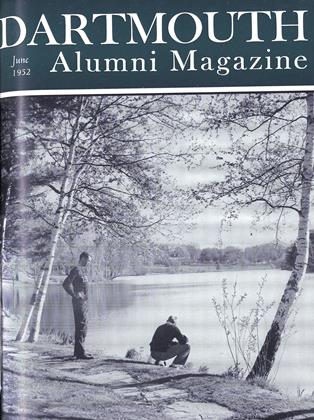Gone Forever
To THE EDITOR:
I have just read with interest the editorial on the necessary increase in student fees. The figures given, with percentages of increase of cost of educating a student and this and that, cause black spots to float before my eyes; mathematics was my toughest hurdle, in fact I always knocked it over while I was there circa 1904-1908.
But this fact remains clearly in mind—that at the various eating clubs the tariff was $3.00 per week if paid in advance and $3.50 on the cuff. There was a club run by "Red" Shipley at $5.00—called the "Millionaires Club." What this club offered over the run-of-the-mill clubs I cannot say as I never saw the inside of it. Then, of course, there was the Commons where "Hen" Teague passed out the "mileage" books for $5.00. What it cost there I cannot say as these books were also collateral, although greatly debased, in the 10-20 games. I am not a meticulous person so I cannot say how much of my coupons went for food and how much to the boys for my failure to get a third to go with the pair I held on the deal. This is a long way around, I realize, but the youngsters now in college have no conception of things back in the "good old days." I thought it might be interesting for them to know.
Brookline, Mass.
About Reunion
The following excerpt is from a letter written by a Dartmouth man to his class secretaryand passed along to the Alumni Magazine assomething worth sharing with other alumni.
When the sentimental glow of reunion has faded, the sober query comes as to whether it is worth the time and money and the interruption of business and social engagements. Reunions have been the subject of astringent satire, much of it written by men who have been given many advantages by American opportunity and have responded by ridicule of American traditions. It may be granted that class reunions are a benefit to the colleges. One may sympathize with this purpose in general and yet feel other loyalties and responsibilities are more pressing. For most men the reunion is a success only if in retrospect it can compete with the alternatives open to the particular individual.
Dartmouth makes an appeal that can be shared only by a comparatively few other colleges, most of which are probably in New England. The average graduate of the great universities, especially those in a metropolis, where the student body is composed of groups with widely differentiated social and scholastic interests, where college study is earlier tied to professional training, and where graduate departments are the dominant university activities, finds himself in a reunion merely to be part of a crowd in a series of public ceremonials. The ordinary alumnus is less of a cipher at a business convention.
Even with the present large classes, I suspect that few men return to Hanover without feeling that they are coming back to a place to which they once belonged. They may live in other beauty spots of America, they may be familiar with the globe's most renowned scenery, but they can scarcely escape a thrill at finding themselves again among the New Hampshire and Vermont hills, strolling again along the elm-bordered green, in a college community so perfect for its setting. The old white college row on an early June morning, or with its gracious lighting on a star-lit night, gives a spiritual lift sufficient for many dull after-days, A reunion might justify itself if it meant nothing more than an interval in a beautiful place, where one had spent a few ardent formative years in a life not sordid. It is more, of course, because one is returning also to the best traditions of American history, to a center where the virtues that have created America have been cherished, where many have loved truth and lavished their best energies to make truth prevail.
An Invitation
Alumni of Dartmouth who are sixty years or over have received a warm invitation to join the first class of a new "college," on a new and beautiful campus.
The Cold Spring Project, at Cold Spring- on-Hudson, near Poughkeepsie, New York, will open its doors October 1 to men and women graduates of selected colleges who have passed the conventional age of retirement. Sponsored by the Walt Foundation, it represents the first opportunity offered to college graduates over sixty to refresh their skills or gain new ones, to re-orient themselves to resources available only to those who have already lived. It will all be done, moreover, in an atmosphere of congeniality and pleasant companionship. The instructors will come from nearby colleges and universities; but often the students themselves, depending on their individual bents and talents, will teach.
The Cold Spring buildings, set on a hillside overlooking the Hudson River highlands, will accommodate residence quarters, classrooms, library, laboratory, workshop and recreation rooms. The curriculum will be varied, flexible and stimulating. It will be fitted to the individual, to his tastes, aptitudes and capabilities. Mrs. William S. Ladd, its originator, states that "the whole plan is conceived to appeal to those who still view life as an adventure, and who accept its challenge."
Interested alumni, free to "retire" onto this new campus, may obtain more information from the Director, Cold Spring Project, Cold Spring-on-Hudson, New York.
 View Full Issue
View Full Issue
More From This Issue
-
 Article
ArticleDeaths
June 1952 -
 Class Notes
Class Notes1918
June 1952 By ERNEST H. EARLEY, DONALD L. BARR, RICHARD A. HOLTON -
 Article
ArticleThe Cold War and Liberal Education To a Father From a Dean
June 1952 By STEARNS MORSE -
 Class Notes
Class Notes1929
June 1952 By F. WILLIAM ANDRES, EDWIN C. CHINLUND, GEORGE B. REDDING -
 Class Notes
Class Notes1926
June 1952 By HERBERT H. HARWOOD, H. DONALD NORSTRAND, ANDREW J. O'CONNOR -
 Article
ArticleThe Undergraduate Chair
June 1952 By CONRAD S. CARSTENS '52







